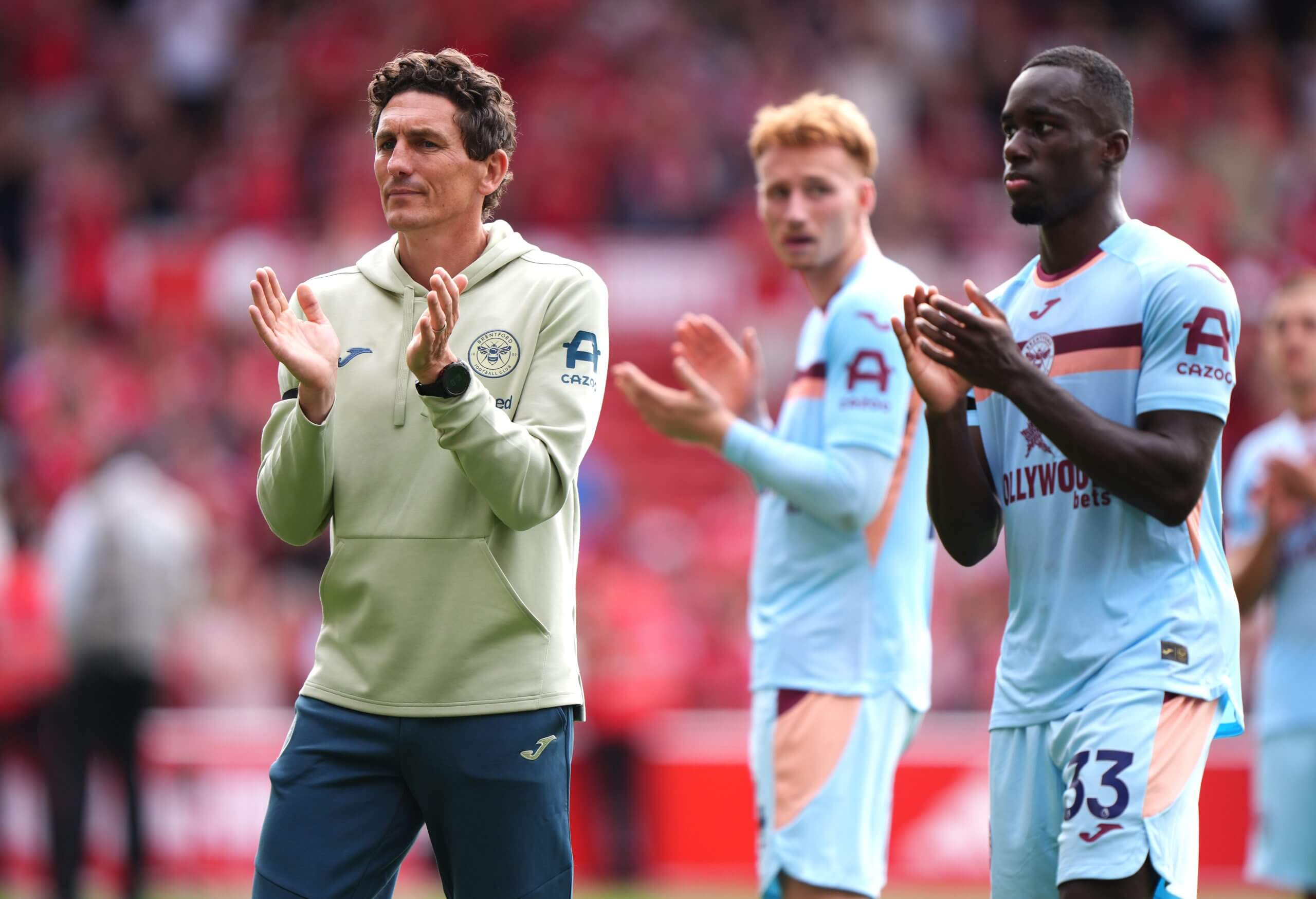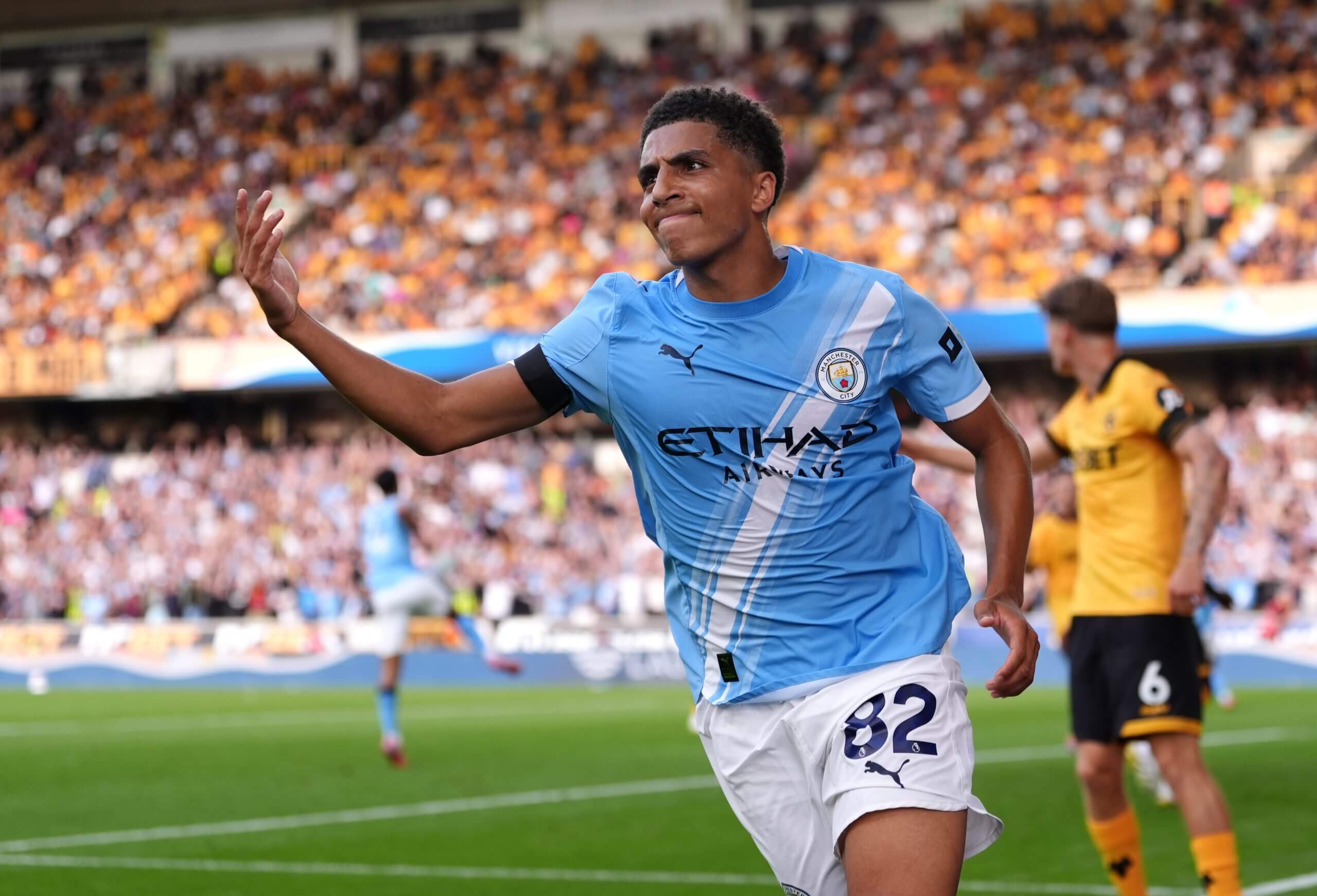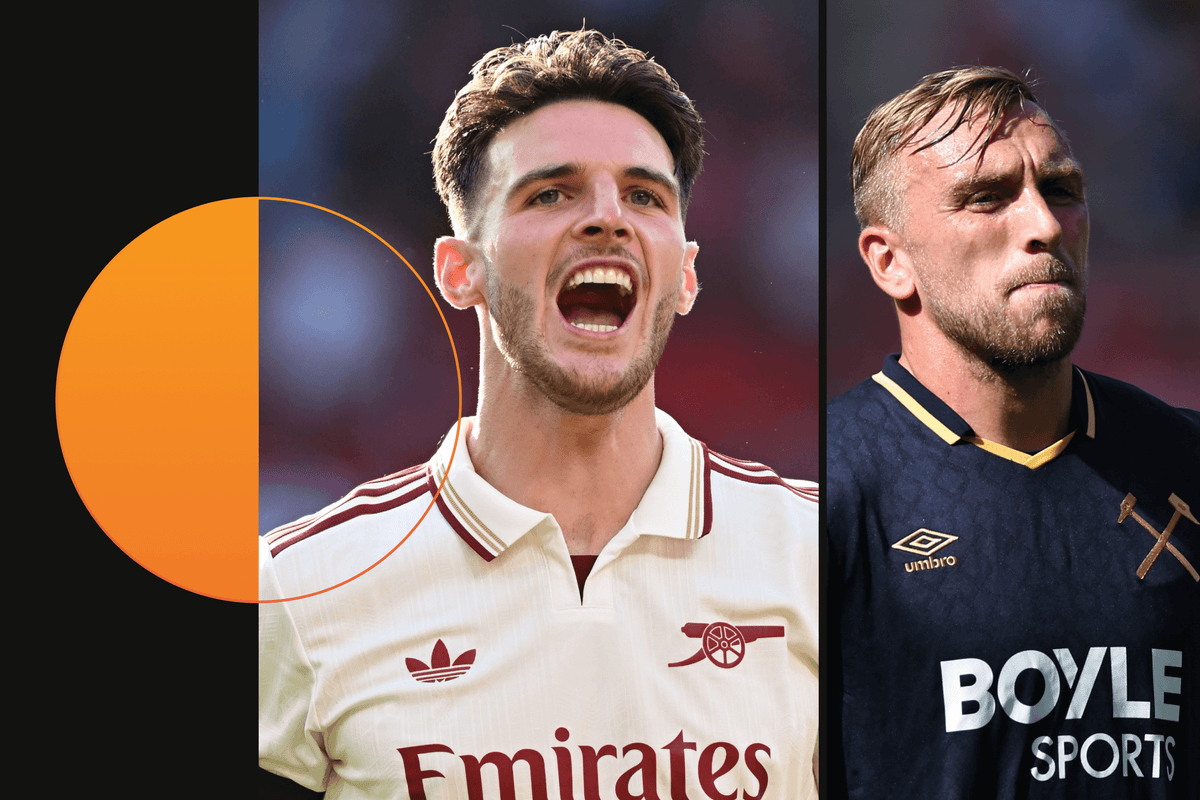Welcome to The Briefing, where every Monday during this season, The Athletic will discuss three of the biggest questions to arise from the weekend’s football in England.
This was the weekend when the Premier League’s 2025-26 campaign began with wins for the usual title-challenging suspects — that will be Liverpool, Manchester City and Arsenal — and saw Sunderland make a raucous return to the top flight with an emphatic 3-0 victory over West Ham United.
Here, we will evaluate Arsenal’s largely unheralded victory over Manchester United at Old Trafford, try to make sense of Pep Guardiola’s too-many-players conundrum at Manchester City and reflect on a dispiriting start for three clubs who might already be afflicted by early-season feelings of dread.
Does Arsenal’s grind deserve more respect?
There was something striking about Mikel Arteta in the build-up to the new season. In his media briefings, he looked consciously upbeat — “super excited”, “can’t wait”, a lot of smiles, radiating positivity, appearing more determined than ever to dictate the tone and mood around his Arsenal team.
At the final whistle at Old Trafford yesterday, he looked elated. There were aspects of their 1-0 win over Manchester United he didn’t enjoy — the number of balls they lost in midfield — but what he loved was the way his players responded to their mistakes, “time after time in an incredible way”.
It is natural to look for something new from a team at the start of a season, particularly when they have been reinforced not just by expensive new recruits in midfield (Martin Zubimendi) and attack (Viktor Gyokeres) but by the sight of others (Ben White, Gabriel, Bukayo Saka, Martin Odegaard) raring to go after last season’s injury troubles.
But what followed in Manchester was a reminder of where Arsenal already excelled: the best record in the Premier League for the previous two seasons when it came to a) the number of goals conceded and b) the number of goals scored from set pieces.
A victory away to United would usually be considered a statement victory for a team with title-challenging aspirations, underlining their mentality, their resilience and many of the virtues that Arsenal have lacked at times during the 21 years since their last Premier League title. When two central defenders perform as well as William Saliba and Gabriel did against a tricky and unpredictable new-look United forward line, the compliments usually rain down.
But, contrary to some of the sillier narratives around this team, their resilience was not in question last season. The more serious questions last term were about whether a more attritional approach had come at the expense of creativity; for all the talk of needing a striker to put away all those missed chances, deeper analysis of those games where points were dropped highlighted a frequent struggle to create openings.
As such, victory over United was not revelatory. Even Gyokeres’ first hour in the Premier League brought no great surprises — good or bad — about a player who was known to be a faster, more aggressive, more direct attacking focal point than Kai Havertz or Gabriel Jesus but far less refined when it comes to build-up play.
As Arteta suggested afterwards, it is a compliment to his team that, after years of misery at Old Trafford in the not-too-distant past, “now we come here and win and we’re still not satisfied”. They should be satisfied, but it says a lot about Arsenal’s particular issues last season — and indeed a lot about a Manchester United side in the early stages of their latest rebuild — that much bigger tests lie ahead for Arteta’s team.
Is it too early to be worried about Brentford, West Ham and Wolves?
Here at The Athletic, we like to counsel against knee-jerk reactions. It is important to live in the moment and to reflect on it, but also to be conscious of the bigger picture. When is the right time to jump to firm conclusions about any player or any team? Hard to know, but not after one game.
Having said all of that, even before the campaign kicked off, it felt like a tough season might, for differing reasons, be in prospect for Brentford, West Ham and Wolves. As it transpired over the opening weekend, they did not just lose their first games but lost them in a manner that reinforced the feeling that choppy waters might lie ahead.
To take Brentford first, Thomas Frank is such a hard act to follow at a club that surpassed every expectation — again — by finishing 10th last season. For his successor Keith Andrews, perhaps the most worrying aspect of their 3-1 defeat at Nottingham Forest was how insipid — how unlike the modern Brentford — they looked in conceding three goals in the first half.
It doesn’t help at all that three key players (Mark Flekken, Christian Norgaard and Bryan Mbeumo) have been sold, a fourth (centre-forward Yoane Wissa) is agitating for a transfer and a fifth (Mikkel Damsgaard) was absent after his wife gave birth. But Andrews called their performance “naive”, which is troubling because it is not a word you would often use of Frank’s Brentford.

(Bradley Collyer/PA Images via Getty Images)
West Ham’s 3-0 defeat at the Stadium of Light was even more alarming, a competent first-half performance followed by a feeble reaction to falling behind to a Sunderland team enjoying their top-flight return to the full. There was little sign of a new-manager “bounce” after Graham Potter took over from Julen Lopetegui in January — or indeed after Lopetegui took over from David Moyes last summer. After winning only 10 Premier League games last season (five in 20 under Lopetegui, five in 18 under Potter), the need for improvement is stark.
Wolves coach Vitor Pereira has more credit in the bank, having overseen a significant upturn after he took charge last December, and there were at least a few encouraging moments before they fell to a 4-0 defeat at the hands of a clinical Manchester City. But they have lost Nelson Semedo, Rayan Ait-Nouri and Matheus Cunha and, from the outside, their squad looks weaker than the one that finished 16th last season.
For the past two seasons, the three newly promoted teams have gone straight back down at the first attempt. It might yet happen again, but if Burnley, Leeds or Sunderland are to survive, then Brentford, West Ham and Wolves are the ones who look most vulnerable — not simply because of what happened at the weekend but because, if anything, those results compounded certain doubts.
Which players does Guardiola want to leave Man City?
There were moments during Manchester City’s opening game against Wolves at Molineux when Pep Guardiola, on the bench, looked so much happier and more relaxed than last season. An emphatic 4-0 victory will do that for a coach, particularly with new signing Tijjani Reijnders making such a positive impact and Oscar Bobb so lively as he looks to put last season’s injury behind him.
But afterwards Guardiola highlighted an ongoing concern about the size of his squad — not the usual managerial gripe about “needing more bodies” but, on the contrary, a genuine sense of angst about “too many people”.
“It’s not healthy,” the City manager said. “You cannot create a good vibe or atmosphere to compete. In the next two weeks, people will talk with players and agents to find a solution.”
It is in this context that Tottenham Hotspur were given encouragement — by whom, it is not clear — about the potential availability of City winger Savinho. Just as surprisingly, Nottingham Forest were given reason to think a deal to sign Rico Lewis might be possible, even though the 20-year-old made clear in a post-match interview on Saturday that he intends to stay at City.

Lewis says he’s staying… but Guardiola needs players to leave (Photo: Bradley Collyer/PA Images via Getty Images)
Ederson’s future remains a source of intrigue, with a young challenger, James Trafford, arriving, another goalkeeper (Gianluigi Donnarumma) persistently linked and enough happening behind the scenes — with Galatasaray interested — for Ederson’s absence on Saturday to prompt raised eyebrows. Guardiola said the goalkeeper was ill, a claim backed up elsewhere.
There isn’t the desperation that Chelsea faced with so many unwanted players as last summer’s transfer deadline approached, but there is certainly a pressure to make sales or at least loans in addition to the departures of Kyle Walker (to Burnley), Maximo Perrone (to Como), Jack Grealish (to Everton on loan) and James McAtee (to Nottingham Forest). Unusually these days, the greatest pressure comes from the coach rather than the need to satisfy PSR’s requirements.
Guardiola is clear City need to move players on before September 1, but, beyond Stefan Ortega and Kalvin Phillips, it is still not clear which of them he would be willing to let go. There are logical “for the right price” candidates, such as Manuel Akanji or Mateo Kovacic, given the fact that City have reinforced in their positions, but their ages (30 and 31 respectively) might make it difficult to find buyers.
If trimming the squad is to be a matter of high priority for Guardiola, there might be some difficult decisions ahead.
Coming up
Leeds United’s return to the Premier League in 2020, after a 16-year absence, coincided with the Covid-19 lockdown, denying their supporters the opportunity to enjoy the experience as they had expected. This season will be different, with a packed — and noisy — Elland Road behind them. Even if it’s hard to imagine them matching their ninth-place finish under Marcelo Bielsa in 2020-21, their fans will be determined to make their mark, starting at home to Everton on Monday night.
It doesn’t get much recognition south of the border, but there has been a steady improvement in Scottish clubs’ performance in European competition in recent years — Rangers reaching the Europa League knockout stage in five of the last six seasons, including the final in 2022, and Celtic making it to the last 24 of the Champions League last term. Both will fancy their chances of reaching the league stage of the Champions League with winnable-looking play-off ties coming up. Both are at home in the first leg: Rangers against Club Brugge on Tuesday evening, Celtic against FC Kairat, of Kazakhstan, 24 hours later.
In other circumstances, Crystal Palace’s first appearance in European competition, at home to Norwegian club Fredrikstad FK on Thursday, would be eagerly anticipated. But there is still a sense of bitterness at Selhurst Park that they have ended up in the Conference League play-off round, after being found guilty of breaching multi-club ownership regulations, with Nottingham Forest taking their place in the Europa League group stage. An uncomfortable night awaits the UEFA delegate, who will no doubt have to report a few tasty chants about European football’s governing body.
Friday night brings us back to the Premier League and Chelsea’s trip across London to face West Ham. Other highlights next weekend include Everton’s first competitive game at their new home, against Brighton, a grudge match (see above) between Palace and Forest at Selhurst Park and, on Monday night, Liverpool’s trip to St James’ Park to face Newcastle United and the wrath of a home crowd. It is hard to see Alexander Isak’s future being resolved before that one.

